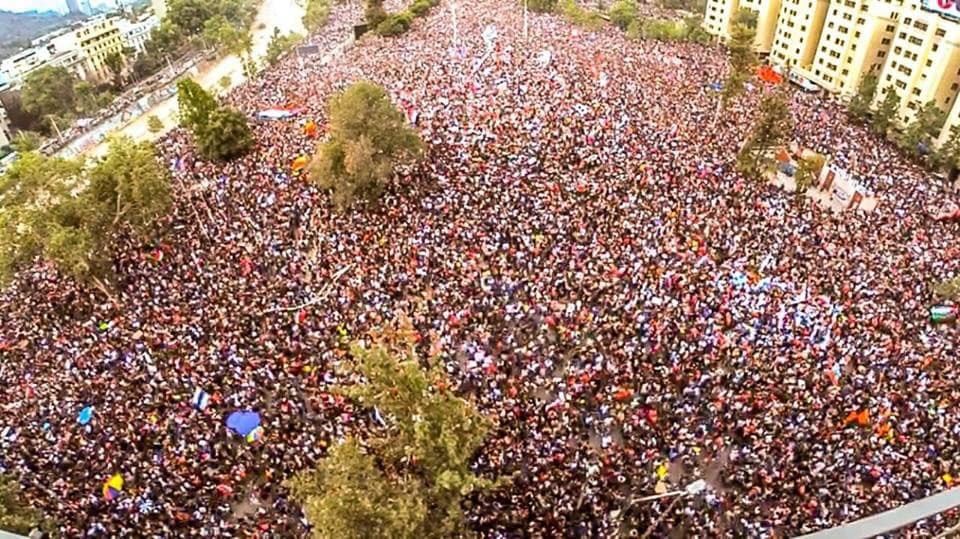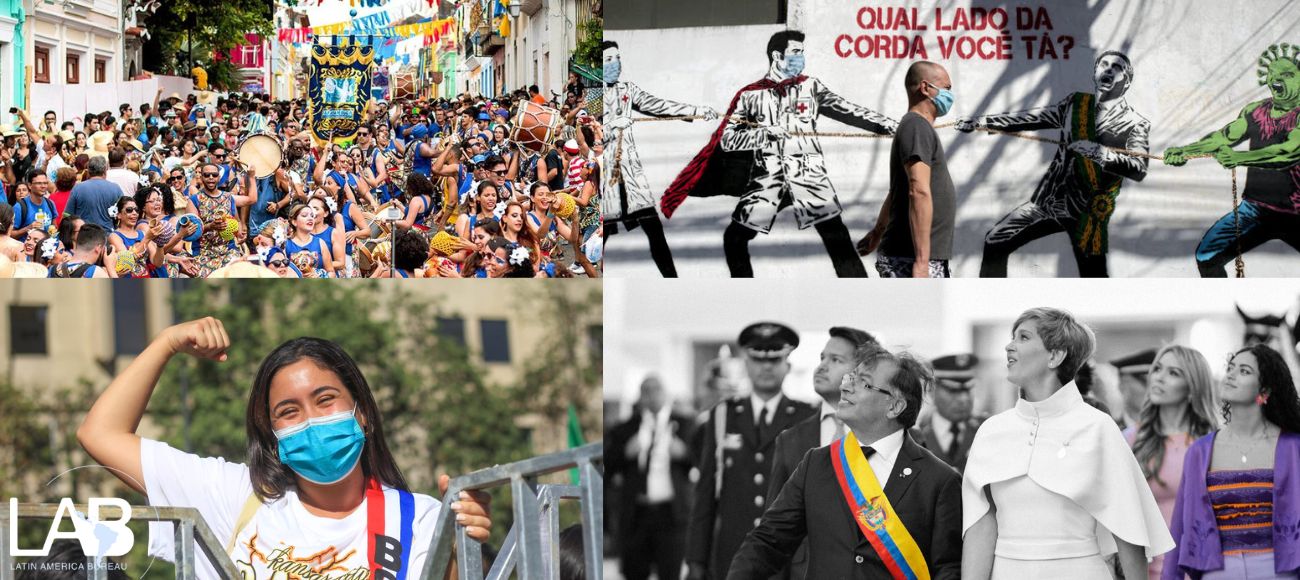It is spring in the Southern hemisphere. But in Chile, this spring is different – Santiago, 29 October
‘Chile has woken up’ is one of the most popular slogans in the recent eruption of social unrest in the country. It has been fêted as the most prosperous country of Latin America, a model, and most recently, by its president as ‘an oasis’ [of calm]. As now seems clear, the country was asleep.
During the first few chaotic days, the right-wing government and most of the mainstream press portrayed what was happening as an explosion of hate. When people poured onto the streets to demonstrate, they were told that they are ‘full of hatred’. President Piñera himself declared the country to be ‘at war with a very powerful enemy’, adding that the coordination of the acts of violence suggested a highly sophisticated level of organisation. Within two days he sent the army, tanks included, onto the streets. So why did the region’s most stable country go from normality to a state of emergency in less than 48 hours?
It all started with a 4 per cent increase in the metro fare, from 800 pesos (1.11 US dollars) to about 830 pesos. It was mainly teenagers who started the protest with mass fare evasion –jumping the metro barriers en masse and then forcing them open to allow everybody to get through for free. The police response was brutal: arrests, water cannon, tear gas, beatings and rubber bullets. Over the next two days, vandalism turned to looting and arson. The army was deployed, and a curfew imposed. Something that everyone thought belonged in the past, had returned, just like that. Nineteen people died in the fires and street violence.
It’s not 30 pesos, it’s 30 years
It seems insignificant, but in the event, 30 pesos was the straw that broke the camel’s back. One placard stated: ‘no son 30 pesos, son 30 años’ (it’s not 30 pesos, it’s 30 years), referring to the 30 years since the end of General Pinochet’s dictatorship and the failure of both centre-left and centre-right coalitions to provide public services to match Chile’s growing wealth. For a country frequently portrayed as a model of successful development, the public education system is piecemeal, under-funded and of poor quality compared to countries with a similar GDP per capita, such as Croatia and Greece.
The health system paints a similar picture: those who pay for a good health insurance can get a first-world standard service, those who can’t get pot luck, lengthy waiting times and poorer outcomes. A minister in Piñera’s government, recently commented on the fact that people need to start queueing at public sector surgeries at 6 am in order to be seen: ‘people get there that early because they like to socialise’. The same kind of condescending, out of touch stance was taken by another minister last week referring to the metro fare increase: ‘if you get up early, you can save money’ – there is a discount on early-morning fares.
The pension system is lamentable. People are obliged to pay into an unregulated private pension system initially imposed during the dictatorship, where huge profits have been syphoned out to shareholders, while returns to pensioners are meagre and precarious. Many people face poverty in old age or having to keep working until they drop.
It shouldn’t be like this. In the last 10 years Chile’s GDP has doubled, it has perennially low inflation and unemployment is consistently below that of many European countries such as France. It became the first South American country to join the OECD in 2010. The problem, however is how that wealth is distributed. Chile is the second richest country in Latin America but has the most unequal wealth distribution in the OECD: 70 per cent of workers earn less than US$800 per month, working an average of 45 hours a week just to scrape by.
For the right, democracy is just a tactic
Despite 30 years of democracy, the government’s recourse to militarism and repression was almost instantaneous. This is a government laced with Pinochet supporters. And this is one of the things the country was asleep about: the fact that the right-wing, who gained power by democratic means this time, has never completely bought into democracy. The security forces are facing accusations of using agents provocateurs to start fires in order to justify the repression – a tactic commonly used under the Pinochet regime.
However, the popular response to the government’s actions has been equally dramatic: first the banging of pots and pans, a traditional Chilean mode of protest by housewives struggling to make ends meet, and then massive demonstrations and marches all over the country, in defiance of the curfew. In the first instance they were demanding that the military be taken off the streets, in a clear rejection of what was an ominous and frightening reminder of the coup d’état of 1973. Two popular slogans have provided more poignant echoes from the past: ‘No estamos en guerra’ [we are not at war] – to directly refute Piñera’s statement, and: ‘el derecho de vivir en paz’ [the right to live in peace] – the title of a Victor Jara song written to oppose the US invasion of Vietnam.
On Friday 25 October the biggest march in Chile’s history took place, with over one million people on the streets of Santiago alone, and massive demonstrations in cities and towns all over the country. In Santiago around 20 per cent of the city’s entire population took part. Opposition parties, as much as the government, were taken by surprise. A peaceful mass movement with no leaders had emerged in days. This is unprecedented.
It’s the inequality, stupid
The demonstrators’ demands have centred on the need to reduce inequality in Chile. Ten days on, people are demanding the changes that have been denied to them for so long. Among other demands, one that is gathering a lot of traction is the writing of a new constitution, to replace Pinochet’s constitution of 1980.
The level of commotion is also unprecedented: a week of paralysed, then partially functioning public transport system in Santiago, many school closures, strikes, and daily demonstrations. The atmosphere is that of a festival, despite the police presence. Music, dance, craft-markets in parks, people hugging each other.
The initial vandalism seems to have given way to a sense of the need to unite to change everything. The government itself and the mainstream media are now all talking about the inequality in the country and president Piñera sacked his entire cabinet and sent the military back to their barracks. There are many calls to go back to normality, but demonstrators say they don’t want normality, they want change. ‘No son 30 pesos, son 30 años’.
Chile has indeed woken up, but what will become of this leaderless movement with no political parties involved is difficult to predict. Demonstrations will start to fade and daily life will resume. But the country won’t be the same afterwards.
LAB adds: Since this article was written (29 October), president Piñera has been forced to cancel two key foreign summit conferences due to be held in Santiago – a serious blow to Chile’s international prestige. The first was the the APEC Asia-Pacific Economic Cooperation conference, on 16-17 November, which Donald Trump and Chinese president Xi Jinping were due to attend. The second was the important UN COP25 climate change summit, scheduled for the first two weeks in December, which had already been moved once – from Brazil, where president Jair Bolsonaro is a declared climate-change sceptic.
With no sign of the protests dying down, President Piñera told the BBC that he has no plans to resign.
Claudia Orellana is a Chilean teacher and writer


